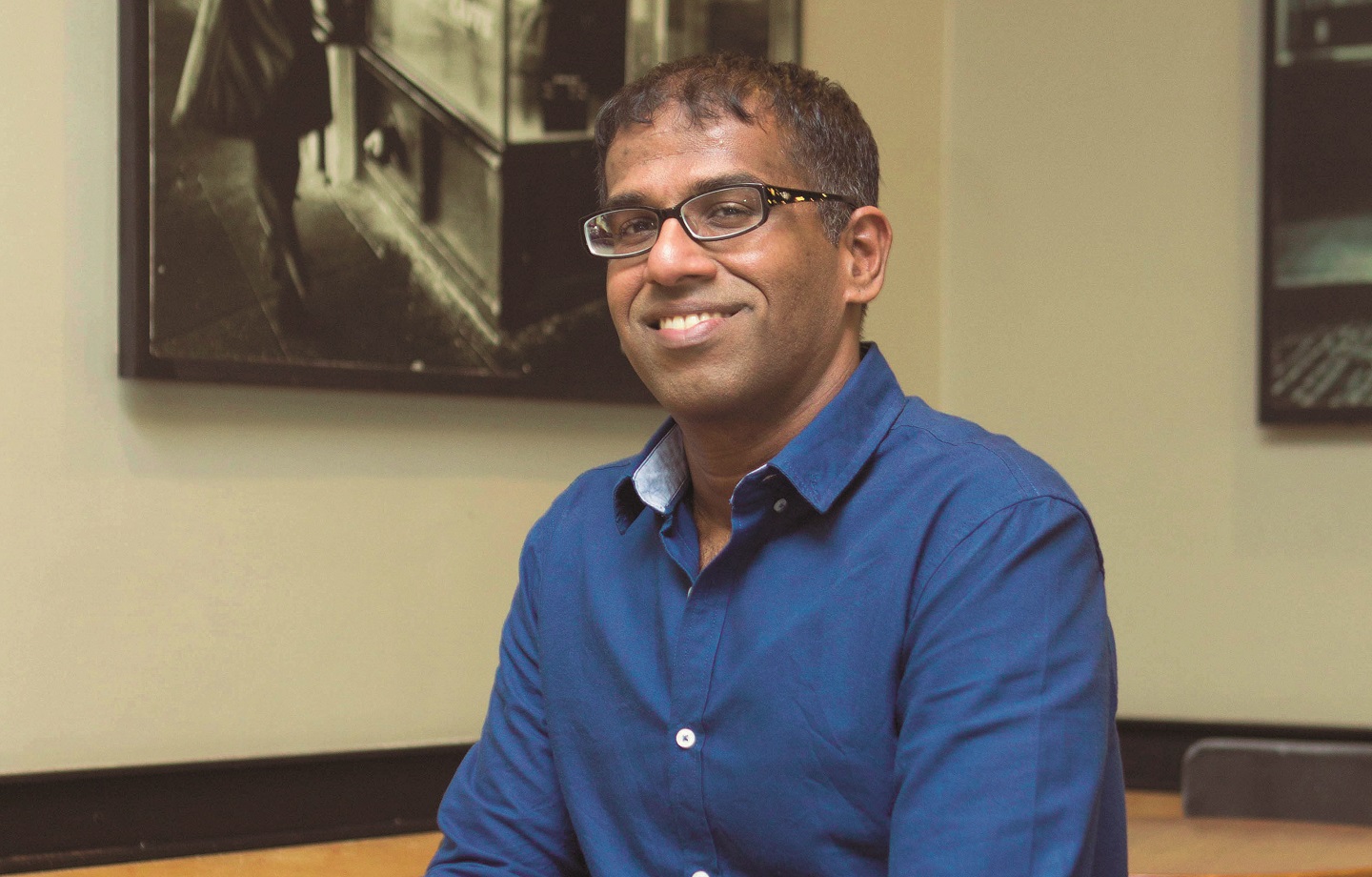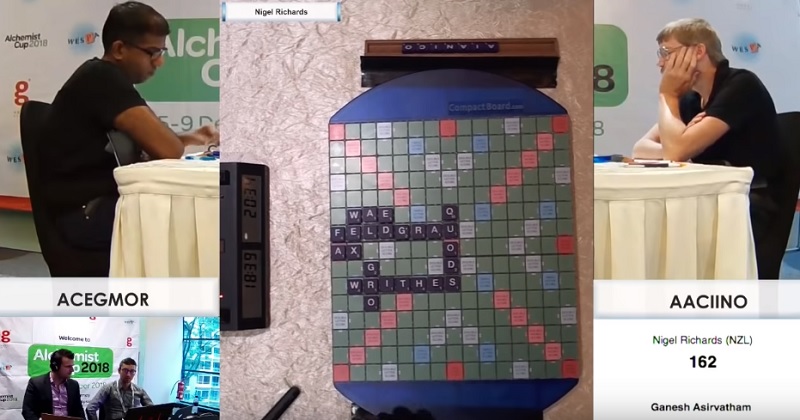
Ganesh was an English teacher when he reached the 2007 World Scrabble Championship finals (Photo: Patrick Goh/The Edge)
The Ganesh Express was a nickname assigned to Ganesh Asirvatham for his then hefty frame and lightning turns at Scrabble. Apart from its politically-incorrect allusions (he has since shed the excess pounds), it conjures an impression of speed and force not often associated with the word game — and part of the reason Scrabble struggled to survive after a boom in the 1980s and 1990s.
Ganesh describes the period as the glory days of the game, when it was a popular social pastime — Parkroyal Hotel Kuala Lumpur even opened the mezzanine floor to players with free-flowing beverages and pastries on Saturdays — and corporate sponsors were eager to direct resources towards tournaments.
His arrival to Scrabble was similar to that of many middle-class Malaysians during that era, picking it up at home alongside chess and Monopoly.
“Monopoly was more obviously interactive and fun, but parents have always seen Scrabble as the more educational diversion,” he says. “I was playing Scrabble and chess at district levels in school but ultimately felt a greater affinity for Scrabble. It seemed to come easier to me.”
Ganesh represented Malaysia at international competitions several times, emerging runner-up in the World Scrabble Championship in 2007, and is currently the world’s top Scrabble player, according to the World English Language Scrabble Players Association (Wespa). He even held a Guinness World Record for most opponents played simultaneously by a single challenger in 2007, winning 21 out of 25 games during the record attempt in Mumbai, India. His triumph has since been surpassed by Sri Lankan national champion Lakshan Wanniarachchi, who took on 40 contenders and bested 31.
“[He’s a] good friend of mine,” says Ganesh when I mention the new record holder. The global Scrabble fraternity seems friendly, brutally taking each other down when facing off in competition and then amiably walking away together. “There is a lot of fellowship. We travel for tournaments, say to Singapore or Hat Yai, and then play a friendly match on the way back to de-stress, maybe with a bet of sorts to make things interesting.”
Starting to play competitive Scrabble in his teenage years meant he came to the board with little experience in managing himself emotionally. It was under the tutelage of his mentor, former national champion Raja Fuadin Abdullah, that he learnt grace and poise under pressure.
“When I was 16, my family happened to move to his neighbourhood and we met each other playing on the same local circuit,” he recalls. “He was happy for me to come over and learn from him. His taking me under his wing was fantastic since I was not going to get that calibre of practice anywhere else. The most important thing he taught me was to be a gracious winner and loser. My ego was massive; I wanted to prove I was the best and took it very personally when I didn’t do well enough.
“Sometimes I would walk by ongoing games and point out missed words or places to other players. People apparently do not appreciate that,” he laughs. “I thought I was being helpful. He taught me to calm down and be courteous, and how to use losses to spur you to work harder. Those were key lessons in acquiring respect for who you are, and not just for your game. I now pass them on to the children I coach. Kids struggle with losing; they get very upset and there are a lot of tears involved. But it builds character. These are part of the shared values within the Scrabble family.”
ganesh.jpg

Ganesh is coaching several contestants for the 2019 World Youth Scrabble Championship that takes place in Malaysia at the end of November. “Some of the young players are almost as good as the adults,” he says. “Not all children are cut out to excel in academics or sports. A few might find a place in Scrabble. We are working closely with Mattel [the manufacturing company behind Scrabble] and the Ministry of Education to create a platform to promote it in schools as a game to enhance language, math and strategy skills.”
Despite his enthusiasm, Ganesh retired from the competition circuit in 2008. He was an English teacher when he reached the 2007 World Scrabble Championship finals, but thought it was time to focus on his career.
“I had achieved all the things I wanted to in Scrabble: was the world No 1, came in second in a world championship, had a Guinness record. I had to pay attention to my livelihood. Scrabble is not mainstream enough to eke out a living; it requires a lot of media buzz and sponsors to get it going,” he says. Once he had a firm foothold in the corporate world, the senior manager in human resources at Standard Chartered Global Business Services decided to throw his hat back in the ring — or tile holder back on the table, rather.
Youth definitely have the advantage in prepping for competition, concedes Ganesh, as a fundamental skill in professional Scrabble — word memorisation — is far more difficult in adulthood.
“There is a laundry list of words you need to commit to memory, which gets tricky with age,” he says. It is hard to quantify precisely, but a Scrabble professional would have an estimated vocabulary of 80,000 to 100,000 words, compared with the average person’s 45,000 to 75,000, depending on their English proficiency. “Many of these words come from different fields of study and their nomenclature or jargon; every element in the periodic table is a playable word, for instance. I can use highfalutin expressions but what they actually mean within their fields, I have no idea.”
The internet has also seen a tsunami of terms from all continents flood into the mainstream. Reliant on the trusty Collins’ Official Scrabble Words dictionary — the standard worldwide reference updated annually to reflect the changing vernacular — Scrabble players are active witnesses to this evolution of language.
“English is spoken with a variety of dialects and slang around the world and lexicographers have to cater for the practices of the global English-speaking population,” says Ganesh, who holds a Master’s in Linguistics. “In the past, they would dictate the standard but words take on a life of their own online and work their way into the official language. We are now using quite a number of Maori words in Scrabble [haka, aroha and heitiki, among others], alongside words like qi and asana as cultural barriers are broken down. And with the evolution of technology too, new terms like doxing and phishing come into play.”
A vast vocabulary is pointless without knowing how to work the board to your advantage, however. “You need the ability to see words,” continues Ganesh. “You have seven random tiles in hand as well as those on the board. You need to figure out what you can build, make sense of the chaos with a finite number of letters. Part of the strategy is keeping track of the consonants and vowels played and adapting accordingly. It is like chess, in that you have to play your opponent’s game as well as your own. Professional players are able to reduce the luck factor to the bare minimum. Scrabble does not operate on an elimination format. It is more like a league system where everyone plays all rounds and has an equal chance of winning.”
The core of the game, however, is about making decisions. “At every turn, there are a number of words you can play and in a very short time, you need to be able to commit to a particular play that will give you the best outcome. Decision-making is a great skill that you can apply to all aspects of life. It teaches you to quickly calculate the odds of success and the trade-offs of decisions made. No matter how slim the odds of winning, I will always take the chance.”
In October, at the World English Language Scrabble Players Association in Goa, India, Ganesh will get the opportunity to pit his skill against Nigel Richards, one of the finest players the Scrabble world has ever seen.
“He astounds me,” Ganesh says frankly. The admiration is not unwarranted. New Zealand-born and Malaysia-based Richards is the only person to have become a world champion more than once (he held the title in 2007, 2011, 2013 and 2018). In 2015, despite not speaking a word of French, the reclusive player won the French World Scrabble Championship after spending just nine weeks studying the French dictionary, and proceeded to repeat the feat again in 2018.
Used to a certain level of competition — Wespa lists his official highest and lowest scores as 709 and 264 points respectively — Ganesh will play with anyone interested in a game. “Whether I bring my best game forward or would truly enjoy the match might be another thing,” he says tactfully. “But I still love the game. I reinforce that idea with the children constantly. Ultimately, you need to enjoy it. The moment it becomes a chore, give it up. There is too much work involved if you are not having fun.
“I like collecting obscure words and throwing them down,” he grins. “There is so much fun in pulling out a word you have been holding onto and having someone challenge its validity. One of my favourites was seeing the word ‘norm’ on the board and extending it by playing ‘normalities’, which is not something you often get to bring out. There are a ton of words I have been waiting to unleash, like wayleggo [A New Zealand shepherd’s call to his sheepdogs].”
Funding from government bodies and corporate sponsors dried up during the 1990s recession and the game’s relative docility (“Unless being pounded by a few hundred points hurts,” jokes Ganesh) means it might never have the appeal of, say, e-sports. To be elevated to a spectator sport and gain media prominence, which in turn brings in sponsors, might require tweaking certain elements. “An MMA version of Scrabble,” he proposes in jest — we think. Imagine the possibilities.
This article first appeared on Aug 26, 2019 in The Edge Malaysia.


